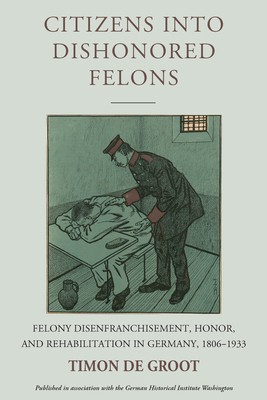
- We will send in 10–14 business days.
- Author: Timon de Groot
- Publisher: Berghahn Books
- ISBN-10: 1800739583
- ISBN-13: 9781800739581
- Format: 15.5 x 23.1 x 2 cm, hardcover
- Language: English
- SAVE -10% with code: EXTRA
Reviews
Description
Over the course of its history, the German Empire increasingly withheld basic rights--such as joining the army, holding public office, and even voting--as a form of legal punishment. Dishonored offenders were often stigmatized in both formal and informal ways, as their convictions shaped how they were treated in prisons, their position in the labour market, and their access to rehabilitative resources. With a focus on Imperial Germany's criminal policies and their afterlives in the Weimar era, Citizens into Dishonored Felons demonstrates how criminal punishment was never solely a disciplinary measure, but that it reflected a national moral compass that authorities used to dictate the rights to citizenship, honour and trust.
EXTRA 10 % discount with code: EXTRA
The promotion ends in 18d.14:33:35
The discount code is valid when purchasing from 10 €. Discounts do not stack.
- Author: Timon de Groot
- Publisher: Berghahn Books
- ISBN-10: 1800739583
- ISBN-13: 9781800739581
- Format: 15.5 x 23.1 x 2 cm, hardcover
- Language: English English
Over the course of its history, the German Empire increasingly withheld basic rights--such as joining the army, holding public office, and even voting--as a form of legal punishment. Dishonored offenders were often stigmatized in both formal and informal ways, as their convictions shaped how they were treated in prisons, their position in the labour market, and their access to rehabilitative resources. With a focus on Imperial Germany's criminal policies and their afterlives in the Weimar era, Citizens into Dishonored Felons demonstrates how criminal punishment was never solely a disciplinary measure, but that it reflected a national moral compass that authorities used to dictate the rights to citizenship, honour and trust.


Reviews